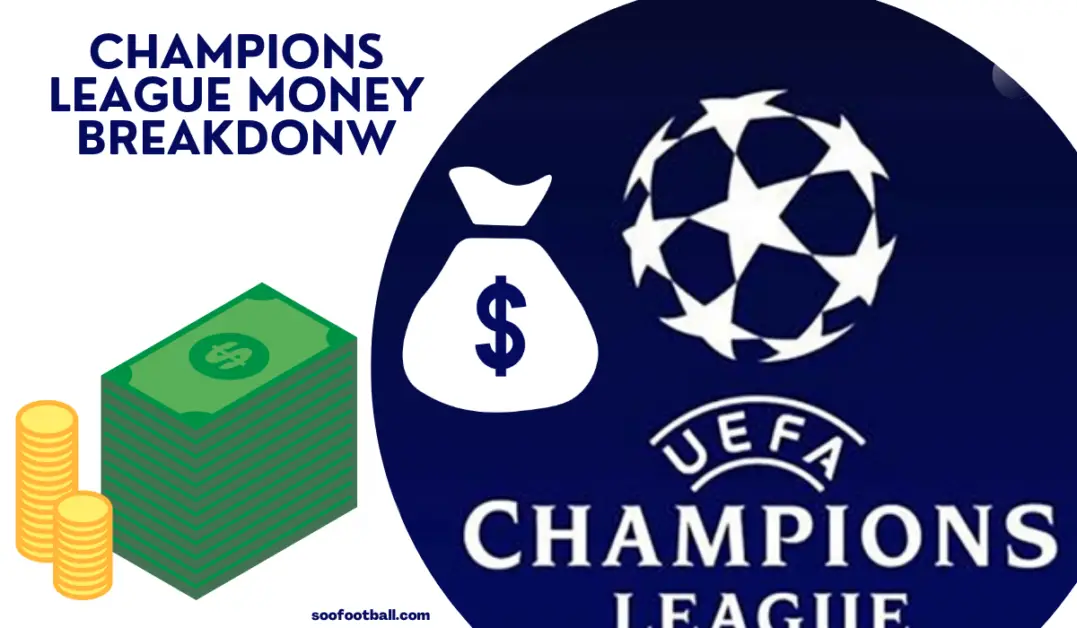Welcome to the business side of the UEFA Champions League. Beyond the glory and bragging rights of the competition, there is a significant financial aspect that many fans may not be aware of. Understanding how participating clubs benefit financially from the tournament (especially the Champions League Prize money) is crucial to get a complete picture of what the tournament represents is vital.
Broadcasting rights, ticket sales, sponsorship deals, and prize money generate revenue for the clubs involved.
This post explores how the Champions League contributes to the financial success of participating clubs. It highlights the tournament’s impact on the financial bottom line of some of the biggest teams in Europe.
So, let’s delve into the details and uncover the financial side of the UEFA Champions League.
Broadcasting Rights
Broadcasting rights are a significant source of revenue for the UEFA Champions League, with millions of fans worldwide watching the matches. The tournament generates revenue by selling the rights to broadcast the games to television networks.
Television networks bid for the rights to broadcast the tournament, with the highest bidder securing the rights. The Champions League is broadcast in over 200 countries, and the revenue generated from broadcasting rights varies depending on the size of the market and the number of viewers.
The revenue generated from broadcasting rights is distributed among the participating clubs. The more matches a team plays and the further they progress in the tournament, the more money they stand to receive. This revenue is an essential source of income for clubs, especially those that do not have the same level of commercial appeal or revenue streams as some of the larger clubs.
The impact of broadcasting revenue on participating clubs can be significant. For example, in the 2020/2021 season, the total revenue generated from broadcasting rights was approximately €2.04 billion. The winners of the tournament, Chelsea FC, received €82.4 million from broadcasting rights alone, while the runners-up, Manchester City, received €77.9 million.
Here is a table that illustrates the broadcasting revenue distribution for the 2020/2021 season:
| Stage of the tournament | Revenue distribution (in millions of euros) |
|---|---|
| Playoff | 380 |
| Group stage | 1,318 |
| Round of 16 | 526 |
| Quarter-finals | 657 |
| Semi-finals | 782 |
| Final | 130 |
| Total | 3,793 |
In essence, broadcasting rights are a crucial revenue stream for the UEFA Champions League, and the revenue generated from broadcasting rights can significantly impact participating clubs.
Television networks play a crucial role in broadcasting the tournament to millions of viewers worldwide, making it one of the most widely watched sporting events globally.
Ticket Sales
Ticket sales are another significant source of revenue for the UEFA Champions League. The tournament generates revenue by selling tickets to fans who want to attend the matches. Let’s take a closer look at how ticket sales contribute to the revenue generated by the tournament.
Various factors, such as the stage of the tournament, the venue, and the teams playing determine ticket prices for the Champions League. Ticket prices can range from a few euros to several hundred euros, depending on the demand for the match and the availability of tickets.
The revenue generated from ticket sales is distributed among the participating clubs. The more matches a team plays and the further they progress in the tournament, the more money they stand to receive.
This revenue is an essential source of income for clubs, especially those that do not have the same level of commercial appeal or revenue streams as some of the larger clubs.
Here is a table that illustrates the revenue distribution from ticket sales for the 2020/2021 season:
| Stage of the tournament | Revenue distribution (in millions of euros) |
|---|---|
| Playoff | 46 |
| Group stage | 252 |
| Round of 16 | 82 |
| Quarter-finals | 103 |
| Semi-finals | 122 |
| Final | 15 |
| Total | 620 |
As we can see from the table, the revenue generated from ticket sales for the 2020/2021 season was approximately €620 million. The impact of ticket sales revenue on participating clubs can be significant.
For example, in the same season, the winners of the tournament, Chelsea FC, received €22.6 million from ticket sales, while the runners-up, Manchester City, received €20.7 million.
Ticket Sales
One of the essential sources of revenue for the UEFA Champions League is ticket sales. If you’re a football fan, you know that the atmosphere in the stadium during a Champions League match is electric, and it’s no surprise that fans are willing to pay a premium to watch their favourite teams compete.
Let’s take a closer look at how ticket sales contribute to the revenue generated by the tournament and how it impacts participating clubs.
Ticket prices for the Champions League are determined by factors such as the tournament stage, the teams playing, and the venue.
For example, tickets for the final are typically more expensive than tickets for earlier stages of the competition. Similarly, a match between two high-profile teams will likely command higher ticket prices than between two relatively unknown teams.
The revenue generated from ticket sales is an essential source of income for participating clubs. The more matches a team plays and the further they progress in the tournament, the more money they stand to receive.
In the 2020/2021 season, the total revenue generated from ticket sales was €620 million, with the highest revenue being generated during the group stage, followed by the semi-finals and quarter-finals.
Here’s a table that illustrates the revenue distribution from ticket sales for the 2020/2021 season:
| Stage of the tournament | Revenue distribution (in millions of euros) |
|---|---|
| Playoff | 46 |
| Group stage | 252 |
| Round of 16 | 82 |
| Quarter-finals | 103 |
| Semi-finals | 122 |
| Final | 15 |
| Total | 620 |
As we can see from the table, the Champions League playoffs generated €46 million in revenue from ticket sales, while the group stage generated €252 million. The income generated from ticket sales is distributed among the participating clubs, which can significantly affect their financial performance.
Prize Money
Prize money is an essential source of revenue for the participating clubs in the UEFA Champions League. The tournament’s revenues determine the prize money distributed among the clubs based on their performance in the competition. This section will discuss how the prize money is distributed in the Champions League, how it is determined, and its impact on participating clubs.
The total prize money for the Champions League is determined before the start of the tournament and is based on the revenues generated from broadcasting, sponsorship, and ticket sales. The total prize money for the 2020/2021 season was €1.1 billion, distributed among the participating clubs based on their performance.
Here’s a table that illustrates the distribution of prize money for the 2020/2021 season:
| Stage of the tournament | Prize money distribution (in millions of euros) |
|---|---|
| Playoff | 30 |
| Group stage | 488 |
| Round of 16 | 69 |
| Quarter-finals | 90 |
| Semi-finals | 120 |
| Final | 15 |
| Total | 1,100 |
As we can see from the table, the group stage had the highest prize money distribution, with €488 million being distributed among the participating clubs.
The prize money is distributed based on a complex formula considering various factors, including the number of clubs participating, the TV market pool, and the UEFA coefficient rankings.
The prize money can significantly impact the financial performance of the participating clubs. For smaller clubs, the prize money earned from the Champions League can represent a significant portion of their annual revenue.
The more a club advances in the tournament, the more prize money they stand to earn. The prize money earned from the tournament can also significantly impact a club’s ability to attract and retain top talent, improving their chances of success in domestic competitions.
Other Financial Benefits
Participating in the Champions League generates revenue through broadcasting rights, ticket sales, prize money and other financial benefits. One such benefit is increased merchandise sales.
As the Champions League generates more exposure for the participating clubs, fans become more interested in buying team merchandise, leading to increased sales.
Moreover, the exposure generated by the Champions League extends beyond just merchandise sales. The tournament is watched by millions of viewers worldwide, and the participating clubs can leverage this exposure to attract new sponsors and investors.
In turn, this can result in increased revenue streams for the club, allowing for further investment in players and facilities.
Participating in the Champions League can boost the club’s brand value. As the club competes internationally, it gains more recognition and respect among football fans and the broader public.
This increased brand value can lead to more lucrative sponsorship and advertising deals, increasing the club’s revenue streams.
How much overall does a Champions League winning team earn?
The overall amount earned by a Champions League-winning team can vary depending on several factors, such as the revenue generated by broadcasting rights, ticket sales, and merchandise sales.
However, based on recent estimates, a Champions League-winning team can earn anywhere from €100 million to €200 million in total revenue.
Broadcasting Revenue Breakdown
Breaking down the revenue sources, the broadcasting rights for the Champions League are estimated to generate around €2.55 billion, which is then distributed among the participating clubs. See the breakdown below:
- €15.64 million for each of the 32 teams in the group stage
- €2.7 million for each win in the group stage
- €0.9 million for each draw in the group stage
- €9.6 million for each team that advances to the round of 16
- €10.6 million for each team that advances to the quarter-finals
- €12.5 million for each team that advances to the semi-finals
- €15.5 million for the runner-up
- €19.5 million for the winner
A Champions League winner can earn up to €80 million from broadcasting rights alone.
Ticket sales revenue for the Champions League is more difficult to estimate as it can vary greatly depending on the size of the stadium and the number of home matches played.
However, a rough estimate is that a Champions League-winning team can earn up to €15 million from ticket sales.
Prize money for the Champions League is also significant, with the winning team earning €19 million in prize money alone. The total prize money for the tournament is estimated to be around €1.95 billion, distributed among the participating clubs based on their performance.
Finally, merchandise sales and brand value can also contribute significantly to the overall revenue earned by a Champions League-winning team.
The increased exposure and recognition generated by the tournament can lead to increased merchandise sales and more lucrative sponsorship deals, further boosting the club’s revenue streams.
Final Thought
The financial side of the UEFA Champions League is a crucial aspect of the tournament that shouldn’t be overlooked.
We’ve explored how participating clubs benefit financially through various revenue streams like broadcasting rights, ticket sales, prize money, and other financial benefits.
Understanding how the Champions League generates revenue and impacts the participating clubs can provide a better understanding of the tournament.
The financial aspect of the tournament is essential not just for football fans but also for club owners and other stakeholders.
In a nutshell, the UEFA Champions League is about the glory of winning the trophy and the financial benefits that come with it.
By understanding the financial side of the tournament, we can appreciate its significant impact on the participating clubs and the football industry as a whole.





